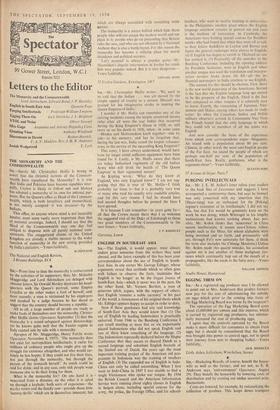SIR,—Mr. Christopher Hollis writes : 'We, used to be told
that the Indian . . . was yet moved by the simple appeal of loyalty to a person. Disraeli was praised for his imaginative stroke in making the Queen Empress of India.'
I wonder if Mr. Hollis can remember any of the moving incidents among the simple untutored masses (who• after all were the ma/ India) that occurred during the King Emperor's illness in 1928; or, still more so on his death in 1936, when—in some cases —Hindus and Mahornedans knelt together—side by side—in • his memory; and has he forgotten that, during the last war, India raised the largest volunteer army in the service of the succeeding King Emperor?
This army, I have always understood, would have been far larger could sufficient equipment have been found for it. Lastly, is Mr. Hollis aware that there are today Indianised regiments of the old Indian Army who still drink the health of 'The Queen Empress' in their regimental messes?
As Kipling wrote: 'What do they know of England, who only England know?' I am not sug- gesting that this is true of Mr. Hollis—I think probably far from it—but it is probably very true of many who read his usually very readable articles, and for this very reason. I feel he should have had second thoughts before he penned the lines I have quoted.
It is because I can remember—in years gone by— all that the Crown meant there that I so welcome the suggested visit of the Duke of Edinburgh to those two great members of the Commonwealth in the near futurc.—Yours faithfully,
J. P. BARDSLEY
Garstang, Lanes


































 Previous page
Previous page